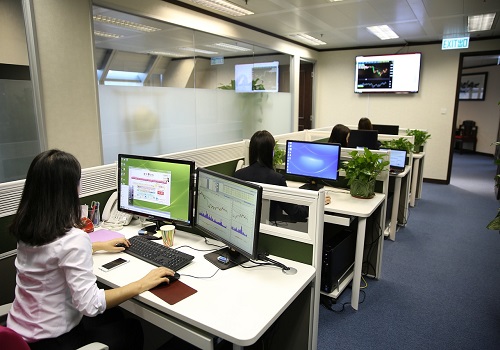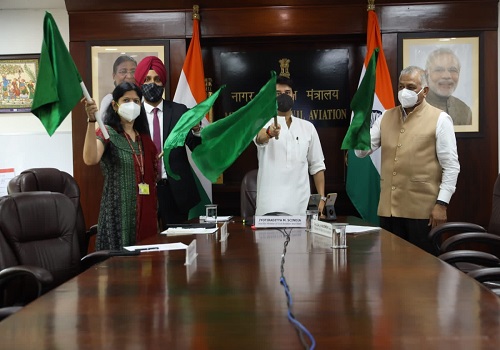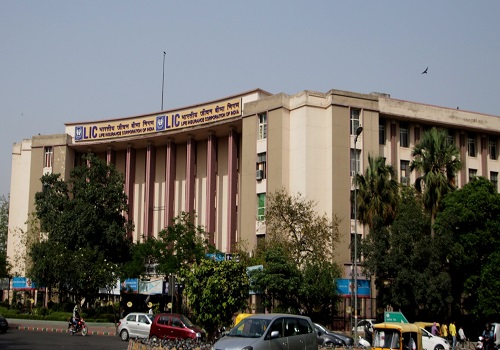Macrotech Developers coming with an IPO to raise Rs 2516 crore

Follow us Now on Telegram ! Get daily 10 - 12 important updates on Business, Finance and Investment. Join our Telegram Channel
Macrotech Developers
-
Macrotech Developers is coming out with a 100% book building; initial public offering (IPO) of 5,17,59,834 shares of Rs 10 each in a price band Rs 483-486 per equity share.
-
Not more than 50% of the issue will be allocated to Qualified Institutional Buyers (QIBs), including 5% to the mutual funds. Further, not less than 15% of the issue will be available for the non-institutional bidders and the remaining 35% for the retail investors.
-
The issue will open for subscription on April 7, 2021 and will close on April 9, 2021.
-
The shares will be listed on BSE as well as NSE.
-
The face value of the share is Rs 10 and is priced 48.3 times of its face value on the lower side and 48.6 times on the higher side.
-
Book running lead managers to the issue are Axis Capital, J.P.Morgan India, Kotak Mahindra Capital Company, ICICI Securities, Edelweiss Financial Services, IIFL Securities, JM Financial, Yes Securities (India), SBI Capital Markets and BOB Capital Markets.
-
Compliance Officer for the issue is Sanjyot Rangnekar.
Profile of the company
The company is one of the largest real estate developers in India, by residential Sales value for the financial years 2014 to 2020. Currently, it has residential projects in the MMR and Pune. In 2019, it forayed into the development of logistics and industrial parks and entered into a joint venture with ESR Mumbai 3 Pte. (ESR), a subsidiary of ESR Cayman, an Asia Pacific focused logistics real estate platform. It also develop commercial real estate, including as part of mixed-use developments in and around its core residential projects.
The company’s customer-centric business model focuses on designing and developing its ‘branded products’ to address consumer needs across locations and price points. Its core competency lies in professionally managing the real estate value chain as it has in-house capabilities to deliver a project from conceptualization to completion. It has a strong focus on de-risking projects and improving its return on investment with fast turnaround time from acquisition to launch to completion.
The company’s brands include “Lodha”, “CASA by Lodha” and “Crown - Lodha Quality Homes” for its affordable and mid-income housing projects, the “Lodha” and “Lodha Luxury” brands for its premium and luxury housing projects, and the “iThink”, “Lodha Excelus” and “Lodha Supremus” brands for its office spaces. Its inhouse sales team is supported by a distribution network of multiple channels across India as well as key non-resident Indian (NRI) markets, such as the Gulf Cooperation Council, United Kingdom, Singapore and the United States.
Proceed is being used for:
-
Reduction of the aggregate outstanding borrowings of the company on a consolidated basis.
-
Acquisition of land or land development rights.
-
General corporate purposes.
Industry overview
The real estate market in India has grown at a CAGR of approximately 10% from $50 billion in 2008 to $120 billion in 2017, and is expected to further grow at a CAGR of 17.7% to reach $1 trillion by 2030. The real estate market contributed approximately 6% to India’s GDP in 2017 and is likely to contribute approximately 13% to India’s GDP by 2025. Residential, commercial and retail are the three key asset classes that have primarily contributed to the growth of the real estate market in India. The percentage of urban population and age distribution profile are key demand drivers for real estate in a country. India with its increasing urban population is a relatively younger nation as compared to developed economies of the world and is likely to retain its position in the future as well. India, with one of the largest workforces, is expected to be a huge market for both, residential as well as other real estate asset classes.
Real Estate (Regulation and Development) Act, 2016 (RERA) came into force with effect from May 2016. RERA was aimed to improve transparency, financial discipline and accountability in the real estate sector in order to increase buyers’ confidence and prevent developers from wilful misuse of funds that led to delay in project execution. Some of the key features of RERA include: (i) registration of projects post receipt of all requisite clearances; (ii) advertisement of projects by developers post RERA registration; (iii) opening of an escrow account for a project to avoid diversion of funds; (iv) providing timeline for project completion; and (v) consent requirement of 2/3rd of the allottees to modify the layout. In last three to four years, the real estate sector in India has witnessed several changes because of demonetization, the liquidity crisis and the implementation of RERA and GST. Despite the spiralling COVID-19 pressure across the country, the Indian residential sector made a significant comeback in Q4 2020 with absorption rebounding to 86% of the corresponding period in 2019.
Pros and strengths
Well-established brand with ability to sell at premium pricing and throughout the construction phase: A strong and recognizable brand is a key attribute in company’s industry, since it increases customer confidence, influences buying decision and helps target premium pricing for products. Its brands include “CASA by Lodha”, “Crown - Lodha Quality Homes”, and “Lodha” for affordable and mid-income housing projects, the “Lodha” and “Lodha Luxury” brands for premium and luxury housing projects and the “iThink”, “Lodha Excelus” and “Lodha Supremus” brands for its office spaces. The strength of its brand and its association with trust, quality and reliability is primarily driven by its track record of delivering quality products, with modern amenities and innovative design elements and landscapes, largely within committed timelines. It has also increased its brand recall through celebrity endorsements and by collaborating with luxury designers.
Proven end-to-end execution capabilities with continuous innovation and ability to deliver projects at competitive cost: The company has adopted an integrated real estate development model, with capabilities and in-house resources to carry on a project from its initiation to completion. Its business development team scouts for land in strategic locations with good development prospects and clean title and focuses on acquiring them at competitive prices. Its brand and ability to sell under-construction developments since the time of their launch attract existing landowners and other developers to approach it in order to monetize their land assets. Further, due to the strength of its brand, lenders to stressed landowners and other developers have provided it with land proposals in several instances. All this coupled with its institutionalized understanding of real estate markets positions it well to quickly identify land parcels and contract with landowners at competitive terms.
Unique ability to develop townships and generate recurring operating cash flows from them: The company has the ability to identify land, acquire it at competitive cost, aggregate it from several landowners and design a master plan to develop township projects. Upon development of the townships, government agencies develop the surrounding infrastructure such as enhancing road and railway connectivity to improve the standard of living for the residents of the townships. It is currently developing large townships located at Palava (Navi Mumbai, Dombivali Region) and Upper Thane (Thane outskirts) under its affordable and mid-income housing projects. Its ability to develop such townships, coupled with the strength of its brand and innovative sales and marketing strategies will help it drive sales volumes and generate recurring operating cash flows for it.
Significant inventory of completed, ready-to-move units: Residential customers in India have started to prefer ready-to-move homes and the COVID-19 pandemic has further accentuated this trend. As of December 31, 2020, the company had approximately 5.5 million square feet of ready-to-move inventory of residential projects in India, which accounted for 29.6% of its total unsold residential inventory, by area. Such inventory status positions it as one of the few real estate developers in India with a diverse portfolio of ready-to-move homes, enabling it to cater to the requirements of residential customers preferring such homes. As of December 31, 2020, 18% of its ready-to-move inventory of residential developments were priced under Rs 10 million, 11% priced between Rs 10 and Rs 30 million, 11% priced between Rs 30 and Rs 50 million, 25% priced between Rs 50 and Rs 80 million and 35% priced over Rs 80 million. During the nine months ended December 31, 2020 and the financial years 2020, 2019 and 2018, it sold 1.6 million square feet, 2.6 million square feet, 2.6 million square feet and 3.4 million square feet of ready-to-move inventory, which represented 58% and 51%, 53% and 57% of its residential Sales from India Operations, respectively.
Risks and concerns
Rely on independent contractors to execute projects: The company and its subsidiaries utilize independent contractors to execute its projects. If a contractor fails to perform its obligations satisfactorily or within the prescribed time periods with regard to a project, or terminates its arrangement with it, it may be unable to develop the project within the intended timeframe and at the intended cost. If this occurs, it may be required to incur additional cost or time to develop the property to appropriate quality standards in a manner consistent with its development objective, which could result in reduced profits or, in some cases, significant penalties and losses, which it may not be able to recover from the relevant independent contractor.
Faces competition: The company’s business faces competition from both national and local property developers with respect to factors such as location, facilities and supporting infrastructure, services and pricing. Intensified competition between property developers may result in increased land prices, oversupply of properties, lower real estate prices, and lower sales at its properties, all of which may adversely affect its business. This may in turn lead to increased competition for location, services and customers, resulting in lower real estate prices and lower sales of its properties. Moreover, it cannot assure you that it will be able to compete successfully in the future against its existing or potential competitors or that increased competition will not have an adverse effect on its profitability.
Significantly dependent on availability of real estate financing in India: The company’s business is capital intensive, requiring substantial capital to develop and market its ongoing and planned projects. The actual amount and timing of its future capital requirements may also differ from estimates as a result of, among other things, unforeseen delays or cost overruns in developing its projects, changes in business plans due to prevailing economic conditions, unanticipated expenses, regulatory changes, and engineering design changes. To the extent its planned expenditure requirements exceed its available resources, it will be required to seek additional debt or equity financing. Additional debt financing, if available, could increase its interest cost and require it to comply with additional restrictive covenants in its financing agreements. In addition, the Indian regulations on foreign investment in housing, built-up infrastructure and construction and development projects impose significant restrictions on it, including the types of financing activities it may engage in.
Significant portion of working capital needs funded by presales: The company typically focus on selling sizeable percentage of units within one year from the launch of a project as well as prior to the receipt of the occupation certificate. Its presales, meaning sales done during launch and construction of a project, have allowed it to benefit from instalment payments from its customers, which it is able to use as working capital and thereby allowing it to maintain healthy levels of working capital and to reduce its debt servicing costs. However, it cannot assure you that it will be able to achieve sizeable percentage of presales in future. Any decrease in its presales may cause its working capital needs to increase. While it aims to sell over 80% of the Saleable Area of a project during the construction phase, it cannot assure you that it will be able to meet such target with respect to all its projects. In addition, its ability to use such presales to meet its working capital needs may be affected by laws or regulations, or changes in the Government’s interpretation or implementation thereof. It may be unable to timely find alternative sources of working capital, which could have adverse effect on its financial position.
Outlook
Incorporated in 1995, Macrotech Developers (Formerly known as Lodha Developers) is the largest real estate developer in India. The company is primarily engaged in affordable residential real estate developments and in 2019, it entered into the development of logistics and industrial parks and also develop commercial real estate. The company has adopted an integrated real estate development model, with capabilities and in-house resources to carry on a project from its initiation to completion. It has a diversified portfolio of residential developments, spread across price points and micro-markets in the MMR, catering to a wide spectrum of economic and demographic segments, from luxury residences in South Mumbai to large, integrated townships in the extended suburbs offering affordable homes. On the concern side, as a property owning and development company, it is subject to the property tax regime in the geographies that it operates in. It is also subject to stamp duty for the agreements entered into in respect of the properties it buys and sell. These taxes could increase in the future, and new types of property taxes, stamp duties may be introduced which would increase its overall costs. Besides, the company’s operations are dependent on its ability to attract and retain qualified personnel. While it currently has adequate qualified personnel, it may not be able to continuously attract or retain such personnel, or retain them on acceptable terms, given the demand for such personnel.
The issue has been offered in a price band of Rs 483-486 per equity share. The aggregate size of the offer is around Rs 2499.99 crore to Rs 2515.52 crore based on lower and upper price band respectively. On performance front, total income increased by 4.9% to Rs 125,609.85 million for the financial year 2020 from Rs 119,788.67 million for the financial year 2019, primarily due to an increase in revenue from operations. Its restated profit for the year decreased by 54.7% to Rs 7,448.36 million for the financial year 2020 from Rs 16,439.77 million for the financial year 2019. The company intends to continue to grow in the MMR real estate market, where it has fared very well. Mumbai’s position as the commercial and financial capital of India, along with the depth of real estate developments across asset classes and categories, provides it with a significant opportunity to market its projects. The company intends to continue to evaluate and acquire strategically located parcels of land at competitive prices while ensuring a disciplined capital structure with the goal of maximizing returns and developing a robust pipeline of projects in the MMR as well as select tier-1 Indian cities.
























